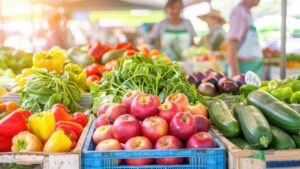Towards Sustainable Food Systems: Empowering Stakeholders for Resilience and Equity

Sustainable food systems are essential in addressing global challenges like hunger, malnutrition, and climate change. There is a need for transformative changes that prioritise sustainability and equitable access to nutritious food. Sustainable food systems offer a multifaceted approach that addresses issues like climate change, unequal food distribution, biodiversity loss, and health concerns. This article advocates for collaborative research and policy innovation in sustainable food systems, emphasising the importance of unrestricted access to research for global collaboration and evidence-based policymaking.
Why the need for sustainable food systems
The quest for sustainable solutions is increasingly urgent in an era marked by climate uncertainty and environmental degradation. Sustainable food systems are pivotal to addressing environmental, social equity, economic, and food security concerns (Anastasiou et al., 2022). These systems integrate holistic approaches to food production, distribution, and consumption to minimise environmental impact, promote social equity, and ensure economic resilience.
Despite progress in alleviating hunger, over 800 million people lack adequate food access, with many in unstable regions. Additionally, around two billion suffer from “hidden hunger” due to micronutrient deficiencies, while another two billion battle obesity-related health issues (Yadav and Maurya, 2022; Fanzo et al., 2022). The current food system fails to meet humanity’s needs efficiently, necessitating significant changes that consider socio-cultural dynamics, equity, and the needs of the poorest. Sustainable food systems prioritise equitable distribution and climate resilience and offer pathways to address hunger, malnutrition, and obesity (Yazdanpanah et al., 2023).
How do sustainable food systems address contemporary challenges?
Sustainable food systems offer comprehensive approaches to confront social and environmental challenges in agriculture. They mitigate climate change through practices like carbon-sequestering soil techniques and promoting local, seasonal foods to reduce transportation emissions (Thamarai et al., 2024). By addressing unequal food distribution, they aim to empower women in rural areas and diversify food production to enhance resilience (Yapa and Pathirana, 2022). Also, sustainable food systems counter health issues linked to modern diets by promoting nutrient-rich, whole foods and supporting local, diverse production. They also promote innovations within local communities and connect them with food sources through education and local food cultivation initiatives (Mehrabi et al., 2023).
Promoting collaborative research and policy innovation in food systems
Accessible research in sustainable food systems fosters global collaboration among researchers, policymakers, and practitioners. Unrestricted sharing of research enhances evidence-based policymaking and equity, which is vital for addressing global food security and sustainability challenges (Stein & Santini, 2022). Enhancing food systems governance involves empowering smallholder farmers and fisheries, fostering inclusivity, and addressing systemic issues through policy and political determination.
Additionally, short-term actions should align with long-term goals, combining crisis management with system-wide restructuring. This means prioritising vulnerable populations in social protection programmes and linking food aid to local, sustainable production. Achieving affordable, nutritious diets requires support for eco-friendly farming methods like agroecology and addressing gender inequalities in food supply chains. Protecting ecosystems involves integrating food systems into biodiversity strategies and promoting sustainable practices (Yazdanpanah et al., 2023). To reshape food systems for climate action, we need ambitious climate plans, renewable energy adoption, and support for local food markets with shorter supply chains.
In conclusion, sustainable food systems offer pathways to address global challenges sustainably, making them an important One Health strategy. Through comprehensive approaches that integrate ecological health, social equity, and economic resilience, these systems pave the way for a more resilient, equitable, and environmentally sustainable future.
References
Anastasiou, K., Baker, P., Hadjikakou, M., Hendrie, G. A., & Lawrence, M. (2022). A conceptual framework for understanding the environmental impacts of ultra-processed foods and implications for sustainable food systems. Journal of Cleaner Production, 368, 133155.
Fanzo, J., Rudie, C., Sigman, I., Grinspoon, S., Benton, T. G., Brown, M. E., … & Willett, W. C. (2022). Sustainable food systems and nutrition in the 21st century: A report from the 22nd annual Harvard Nutrition Obesity Symposium. The American Journal of Clinical Nutrition, 115(1), 18-33.
Tugume, P., Mustafa, A. S., Walusansa, A., Ojelel, S., Nyachwo, E. B., Muhumuza, E., … & Ssenku, J. E. (2024). Unravelling taboos and cultural beliefs associated with hidden hunger among pregnant and breast-feeding women in Buyende district Eastern Uganda. Journal of Ethnobiology and Ethnomedicine, 20(1), 46.
Mehrabi, S., Perez-Mesa, J. C., & Giagnocavo, C. (2022). The role of consumer-citizens and connectedness to nature in the sustainable transition to agroecological food systems: The mediation of innovative business models and a multi-level perspective. Agriculture, 12(2), 203.
Stein, A. J., & Santini, F. (2022). The sustainability of “local” food: A review for policy-makers. Review of Agricultural, Food and Environmental Studies, 103(1), 77-89.
Thamarai, P., Deivayanai, V. C., Saravanan, A., Vickram, A. S., & Yaashikaa, P. R. (2024). Carbon mitigation in agriculture: Pioneering technologies for a sustainable food system. Trends in Food Science & Technology, 104477.
Wijerathna-Yapa, A., & Pathirana, R. (2022). Sustainable agro-food systems for addressing climate change and food security. Agriculture, 12(10), 1554.
Yadav, L., & Maurya, N. K. (2022). Fight hidden hunger through national programs and food-based approaches. In Combating Malnutrition through Sustainable Approaches. IntechOpen.
Yazdanpanah, M., Löhr, K., Hoffmann, H. K., Welte, S., Klaus, L. M., Zobeidi, T., & Rybak, C. (2023). Integrated food-based multi-actor approach to combat malnutrition. Frontiers in Sustainable Food Systems, 7, 1179768.
Author

Dr. Shivaprasad Shivappa Desai
Dr. Shivaprasad Shivappa Desai is a Master's candidate in Veterinary Public Health at Kerala Veterinary and Animal Sciences University (KVASU). With a foundation in veterinary medicine, Dr. Desai has a strong commitment to the integration of human, animal, and environmental health. His research interests include zoonotic diseases and community health interventions, with a focus on addressing health disparities and advancing sustainability through interdisciplinary collaboration. Outside of academics, he actively advocates for One Health principles and contributes to public health policy and environmental stewardship, aiming to foster a healthier, more sustainable future.





